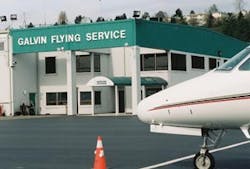SEATTLE — In October 2001, Quantem FBO Services, LLC, an aviation investment firm, acquired the assets of Galvin Flying Services, Inc. at Boeing Field here from Peter Anderson, nephew of founder Jim Galvin. Following the acquisition, Anderson stayed on as president, notably to oversee the construction of a new corporate aviation complex, Quad 7, which will soon break ground, as well as to orchestrate a new lease and terminal complex. It’s part of the reinvention of a fixed base operation rooted in the industry, having opened in 1930.
Quantem FBO Services is headed up by long-time FBO players Blake Fish, president, and Doug Crowther, executive vice president/COO, who also serves as the general manager of Galvin Flying Services.
Explains Crowther, “I am the conduit between this operation and our financial owners. My title is chief operating officer for Quantem, but I’m actually acting general manager for this location. We’ve got Peter focused on some strategically important topics. He’s heavily involved with our Quad 7 project; he’s involved with negotiating the lease extension here for our new FBO. He is very well in tune with the local politics.
“We keep him focused on the higher level visionary things. I’m focused on the day to day operation.
“What Quantem brings to the party here is we brought in some measuring tools for each department to monitor the business. My role is to monitor the business, measure it, and tweak it wherever necessary.”
Quantem also brings the investment tools which Anderson says served as the catalyst for him to even consider selling the FBO and letting it go from family hands. “I had and still have no interest in retiring,” explains Anderson. “My desire with Galvin was we had gotten to a plateau that to get to the next level it would require an infusion of capital that I just simply didn’t have the capacity to do. I was excited when Quantem offered me the opportunity to be on board as president.
“When all is said and done, it will probably be about a $60 million of infusion of capital.
“So my role is to continue as president, and to shepherd the operation here. At the time, the thought was that they would be out looking to acquire additional FBOs, and the employment team would stay in place just the way it was.
“I expect to continue on here for at least another four years or so to see the expansion that I had hoped to have occur actually happens. It’s going to be an addition of quite a bit of extra hangar space, and a complete redevelopment of our FBO leasehold. Those are my two babies — they were the reason for selling. I’d like to stay here to see those through.”
The new corporate complex is to be built at 7777 Perimeter Road — thus the ‘Quad 7’ moniker — and is billed as “a private aircraft facility worthy of a Seattle address.” The build-out is estimated at $40 million and will be built in two phases on some ten acres at Boeing Field, just across the field from where green 737s are brought for finishing by Boeing. Says Fish, “We’re at the point where we’ve got commitments to fill the first phase, which is three hangars. We have a major company that’s our anchor tenant; then we have two common storage hangars where we’ve got letters of intent from our existing customers and some that are not existing customers to come in and fill these two up. We’re in the permit phase now for Phase 1 for the complete site development and the first three hangars. Once that’s finalized, there’s the financing, which is always an issue. Once that’s done we’ll start construction.”
At the same time, Anderson is overseeing the reengineering of the FBO leasehold, with a new terminal in the offing. “Right now, our main FBO terminal is sort of smack dab in the center of a leasehold,” explains Anderson. “Our plan is to take down the existing terminal and replace it either at the very east end of our existing leasehold, or to the very south end of our existing leasehold, to effectively double our ramp space. At the same time, we expect to double the size by going up to a second or third story in the terminal for office space.
“We are woefully short of both office and ramp space. Our primary goal is to get more ramp space.”
Fish and Anderson both emphasize the resiliency of the Seattle market, though the Galvin business is down overall some 25 percent over a year ago, they say. Comments Fish, “We have not seen, to my knowledge, any major selloff of aircraft here in the bay area; what’s happened is things have slowed down. So, if anything, maybe the expansion of demand has slowed, as opposed to the demand going away. We actually slowed down later than much of the country, and I believe we will come back more quickly, just because of the strength of this city and its economy.”





